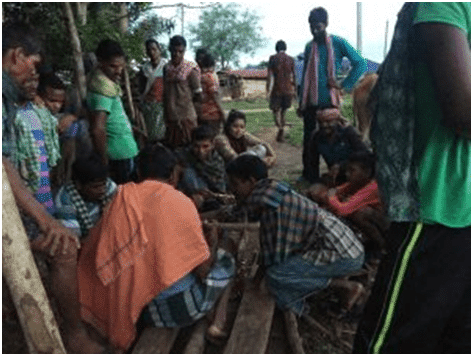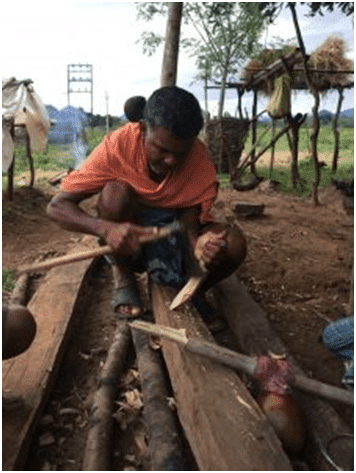
Yesterday when I went to the village Kankubadi after some 3 weeks wondering if Dhundku, an old musical instrument from Kondh tribe still exists. I saw Dhundku in the art gallery of a tribal museum in Bhubneshwar and other time it was displayed in Mitra school’s museum ( a residential school in kachapaju, Bissamcuttack) in their annual function. And since then I’ve been enquiring about the instrument in the different villages we work in. So Padmavati, a saathi from village Bondaiguda said that years back there were story tellers who’d sit and play these instruments and recite stories or folk tales of good and bad, life and death, near and far for hours at times from dusk to dawn. Children, teens and adults would love to hear’em and be there in those live performances. It was mesmerising to just hear of something like this existing and I just wanted this informative and lively performance to occur again and hence I asked Padmavati if anyone in and around our villages can make and play this instrument or if even a piece of it is left in any of the houses. And then she asked me to check in Kankubadi and to my awe there was none around anywhere in Bondaiguda.  Hence I enquired in Kankubadi and Haldhara and Kalavati, saathi in Kankubadi helped me reach a man who had an old imperfect Dhundku in his house. And you should see how the villagers started with making a perfect instrument by hearing to not so satisfying sound of an old imperfect Dhundku. One came, then another and then some 10-12 people gathered around eagerly helping and waiting for the instrument to get ready. All this without any prior invitation or knowledge. The strings broke thrice but they kept trying till late dusk, they measured the size of the wooden cork by just looking at the hole and without using any measuring tape etc. And then when light faded pretty much they stopped and said we’ll do this tomorrow. Haldhara also spoke of a blind story teller named MugriKumrika from Balipadar, the only one known and most probably left of the folk tale reciters. We plan on calling him to the village and listen to the stories of past and present back again from dusk to dawn near that big imli tree on the periphery of the big pond in Kankubadi. – PrituVatsa Intern, Klorofeel Foundation.
Hence I enquired in Kankubadi and Haldhara and Kalavati, saathi in Kankubadi helped me reach a man who had an old imperfect Dhundku in his house. And you should see how the villagers started with making a perfect instrument by hearing to not so satisfying sound of an old imperfect Dhundku. One came, then another and then some 10-12 people gathered around eagerly helping and waiting for the instrument to get ready. All this without any prior invitation or knowledge. The strings broke thrice but they kept trying till late dusk, they measured the size of the wooden cork by just looking at the hole and without using any measuring tape etc. And then when light faded pretty much they stopped and said we’ll do this tomorrow. Haldhara also spoke of a blind story teller named MugriKumrika from Balipadar, the only one known and most probably left of the folk tale reciters. We plan on calling him to the village and listen to the stories of past and present back again from dusk to dawn near that big imli tree on the periphery of the big pond in Kankubadi. – PrituVatsa Intern, Klorofeel Foundation.
 Hence I enquired in Kankubadi and Haldhara and Kalavati, saathi in Kankubadi helped me reach a man who had an old imperfect Dhundku in his house. And you should see how the villagers started with making a perfect instrument by hearing to not so satisfying sound of an old imperfect Dhundku. One came, then another and then some 10-12 people gathered around eagerly helping and waiting for the instrument to get ready. All this without any prior invitation or knowledge. The strings broke thrice but they kept trying till late dusk, they measured the size of the wooden cork by just looking at the hole and without using any measuring tape etc. And then when light faded pretty much they stopped and said we’ll do this tomorrow. Haldhara also spoke of a blind story teller named MugriKumrika from Balipadar, the only one known and most probably left of the folk tale reciters. We plan on calling him to the village and listen to the stories of past and present back again from dusk to dawn near that big imli tree on the periphery of the big pond in Kankubadi. – PrituVatsa Intern, Klorofeel Foundation.
Hence I enquired in Kankubadi and Haldhara and Kalavati, saathi in Kankubadi helped me reach a man who had an old imperfect Dhundku in his house. And you should see how the villagers started with making a perfect instrument by hearing to not so satisfying sound of an old imperfect Dhundku. One came, then another and then some 10-12 people gathered around eagerly helping and waiting for the instrument to get ready. All this without any prior invitation or knowledge. The strings broke thrice but they kept trying till late dusk, they measured the size of the wooden cork by just looking at the hole and without using any measuring tape etc. And then when light faded pretty much they stopped and said we’ll do this tomorrow. Haldhara also spoke of a blind story teller named MugriKumrika from Balipadar, the only one known and most probably left of the folk tale reciters. We plan on calling him to the village and listen to the stories of past and present back again from dusk to dawn near that big imli tree on the periphery of the big pond in Kankubadi. – PrituVatsa Intern, Klorofeel Foundation.
